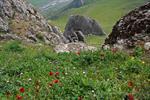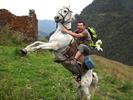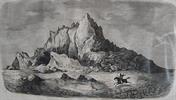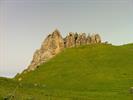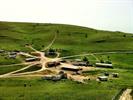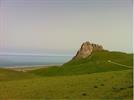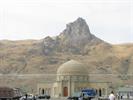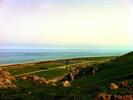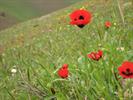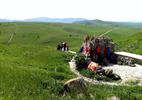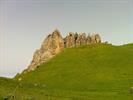The dull scenery north of Baku gets an unexpectedly abrupt and dramatic boost with the looming silhouette of 520m Beshbarmaq Dash (Five Finger Mountain). This mystical peak brandishes a rocky fistful of phallic crags atop a super-steep grassy ridge top. It’s well worth climbing to the summit, not just for the fabulous Caspian views, but also to observe first hand Azerbaijan’s unique take on ‘Islam’. Crowds of locals come here seeking good fortune, a child, or the answer to their problems using a mixture of prayer, sacrifice, chanting and very animist kissing of rocks. Everything comes in threes: take three small stones to the top, sip thrice from a cup of holy water, kiss the sacred rock three times then incant your wish…guess how many times. To assist, assorted white-capped holy men lurk in rocky nooks, their pitches marked by a samovar, a few blankets and some photogenically fluttering votive ribbons. Meanwhile a few old crones, snotty children and various hangerson try to cadge money.
Visible for miles, Besh Barmaq is a natural fortress. For centuries it guarded the narrowest strip of coastal plain and a wall between the crag and the sea funnelled all commerce through a controllable gateway near which was a great caravanserai.
Its antiquity and cosmopolitan clientele are clear from 18th-century travellers' reports which noted that the caravanserai walls were covered in the graffiti of a dozen languages including French, Polish and Arabic. A painting in Baku's Historical Museum shows it as being close to the water's edge but this is either artistic licence or represents the Caspian in an unusually high mood.
The caravanserai has now vanished entirely. In its place is a small roadside Namazkah (prayer room) and new mosque paid for by nazit donations of passing motorists who almost unanimously stop to sip from the water source.
Climbing Besh Barmaq
The curious Azeri blend of Islam and Animism is nowhere more vividly portrayed than amid the spooky pinnacles of Besh Barmaq. All prayer and genuflexions, pilgrims struggle up the mountain in their Sunday best. In places the rock has been kissed smooth by a procession of devout lips. At the very top, old women hold out knarled begging hands and several mendicant sages lead prayers on precarious ledges with spectacular views.
You may be lucky enough to hear the superhumanly-rapid babble of prayers - supposedly Islamic and led by a Mollah but to all intents and purposes an ancient animist rite evoking the dark powers of the rock beneath very Tibetan-looking prayer knots. It's an odd and eerie atmosphere, though often over-busy at weekends.
Climbing to the summit from the ridgetop parking area takes around 15 minutes via a wobbly set of metal staircases: start on the southwest side above some tea sheds. Reaching the car park requires a steep 10-minute drive leaving the Quba highway 2km north of a very obvious new stone mosque that’s amid roadside stalls immediately below the peak. Most Baku–Quba buses make a refreshment stop beside the mosque but although you could walk up Beshbarmaq directly from this point it would take (at least) a very sweaty 90 minutes.
If you have your own vehicle, however, it's perfectly feasible to drive most of the way up by the access track which turns inland some 19km beyond the railway bridge, ie about 3 km north of Namazkah. The track is quite steep and not recommended if wet, but despite a few stones is perfectly possible without a 4WD. The parking area has a 'sacrifice' point and a fresh-water well of holy water which is in considerable demand.
A 10-minute walk up the steep grassy bank brings you to the base of the rock pinnacles. These are laced with metal stairways, steps and footholds which seem dauntingly steep at times. Nonetheless, even the most rotund pilgrims seem able to climb them in high heels.
If you're planning a trip to Azerbaijan you may be interested ▶ Azerbaijan highlights - For those who prefer to go unbeaten path, to explore less visited places and check national charisma of this small country in Southern Caucasus on the edge of Europe.



